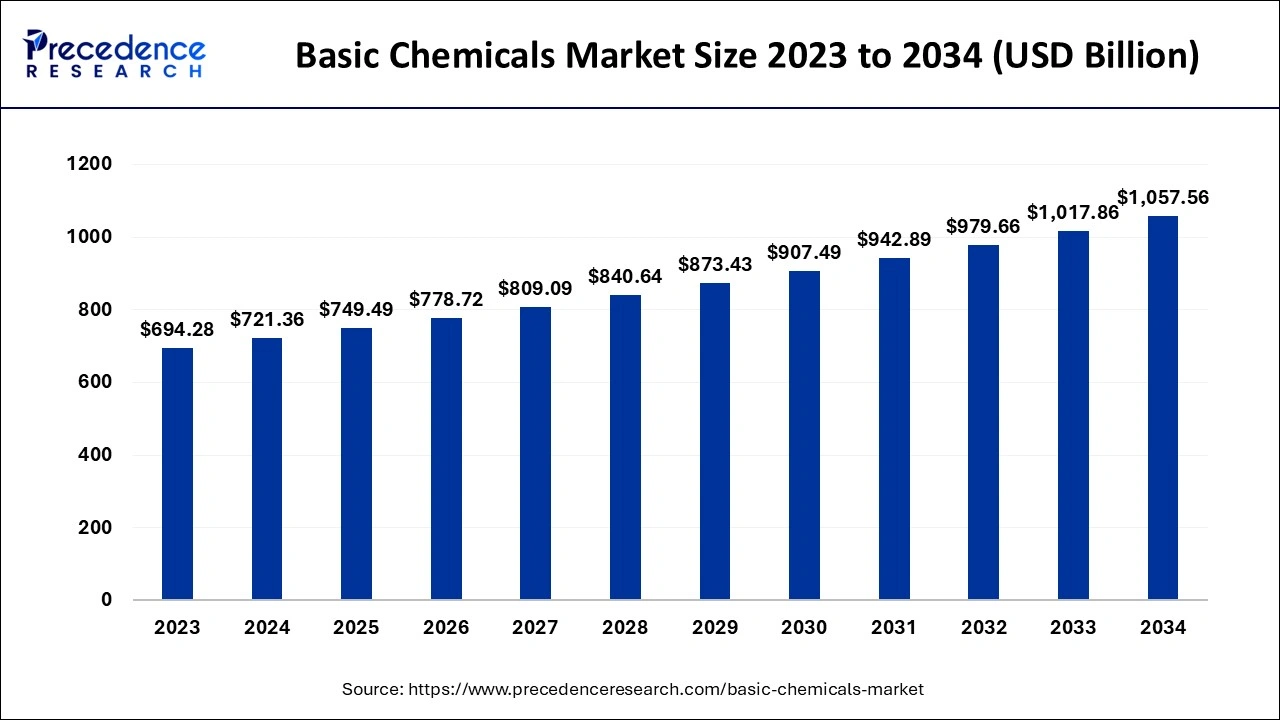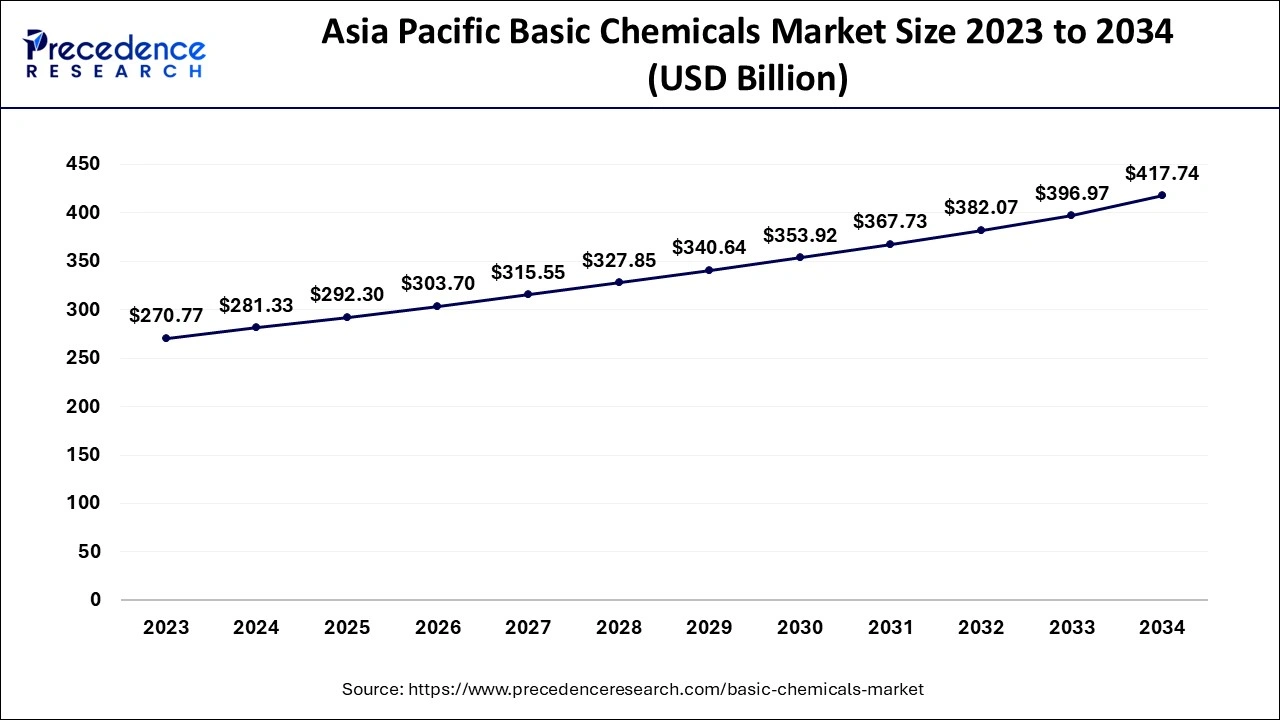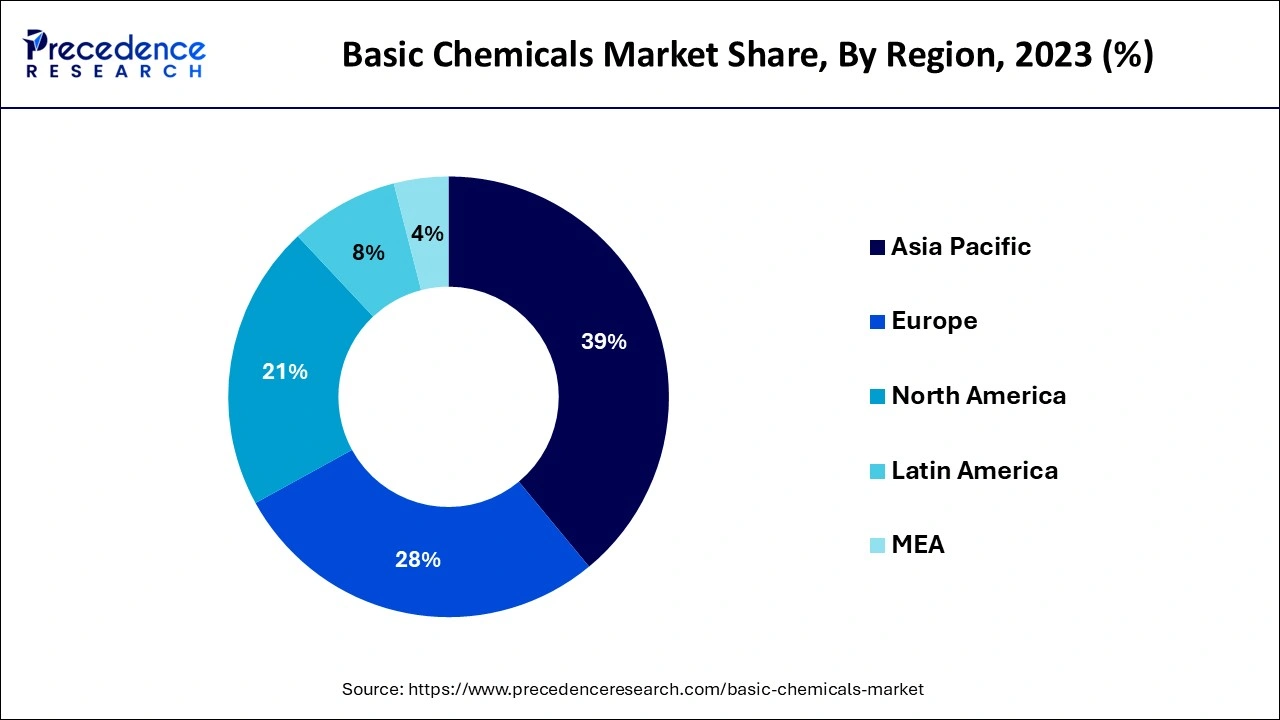January 2025
The global basic chemicals market size accounted for USD 721.36 billion in 2024, grew to USD 749.49 billion in 2025 and is predicted to surpass around USD 1057.56 billion by 2034, representing a healthy CAGR of 3.90% between 2024 and 2034.
The global basic chemicals market size is estimated at USD 721.36 billion in 2024 and is anticipated to reach around USD 1057.56 billion by 2034, expanding at a CAGR of 3.90% from 2024 to 2034.

The Asia Pacific basic chemicals market size is evaluated at USD 281.33 billion in 2024 and is predicted to be worth around USD 417.74 billion by 2034, rising at a CAGR of 4.02% from 2024 to 2034.

Due to the abundance of the chemical industry, the Asia-Pacific region dominated the worldwide market for basic chemicals. This dominance in the basic chemicals industry is caused by the substantial presence of producers of petroleum chemicals in China and India. Furthermore, it is anticipated that factors like rising investment and fierce rivalry would fuel demand in the Asia-Pacific basic chemicals market. Due to the growth of the transportation sector, which comprises the car, airline, and maritime sectors, North America is also anticipated to have a sizable market share in the upcoming years.

Basic chemicals are produced in vast numbers and play a significant role in the creation of goods that are consumed by consumers and the general public. Among them are fundamental inorganics, intermediates in chemical processes, and chemical raw materials derived from oil. Understanding the manufacturing procedures and chemical composition of these fundamental compounds is essential for achieving cost-saving objectives and adhering to increasingly strict security and ecological norms. One of the key reasons driving the worldwide market for basic chemicals is the expanding use of these chemicals in the food and beverage sector. To enhance the flavors and fragrance, and appearance of food, a variety of chemicals are used as direct food additives. These substances can also function as preservatives, limiting bacterial activity and avoiding spoilage. In the food industry, chemical products are also employed to create packaging that will come into contact with food. They include utensils, containers, foils, and a range of other things.
The pharmaceutical business is expanding quickly, which is motivating the major players to increase the production of organic and inorganic basic chemicals. A fundamental chemical raw material utilized in pharmacies is chlorine. It serves as the first stage in the manufacturing of medications. Additionally, it's conceivable that it enters their molecules. There are several different sorts of medicines that may be made with chlorine. Health risks related to basic chemicals and tight regulatory requirements for their use are some of the reasons that are restricting the market's growth. Chemical and hazardous chemicals can result in a range of physical and physiological issues, including flammability, corrosion, and explosibility, as well as health issues including irritability, sensitization, and carcinogenicity. The OSHA-recognized Hazard Communication Standard (HCS) is designed to ensure that employers and employees are educated about potential dangers from dangerous chemical substances in the workplace as well as preventative actions. In addition, the expansion of private and public major investments in the chemical sector is one of the trends in the global basic chemicals market that is anticipated to open up a lot of potentials for the market to expand in the years to come.
Chemicals are more in demand when emerging sectors start to take off as a result of development. The term "basic chemical products" refers to a broad range of chemicals used in anything from engineering to textiles, paints, and inks to crop protection. To suit consumer demands and new environmental restrictions, new goods are continually being produced.
The key drivers of the growth of the global basic chemicals market are the expanding use of basic chemicals in the food and beverage industry and the expansion in the pharmaceutical industry. Chemicals may be extremely important in the production and preservation of food. Food additives, for instance, may increase the shelf life of some meals while others, like colors, may make them look more appetizing. Food is given a flavor boost through the use of flavorings.
| Report Coverage | Details |
| Market Size in 2024 | USD 721.36 Billion |
| Market Size by 2034 | USD 1057.56 Billion |
| Growth Rate from 2024 to 2034 | CAGR of 3.90% |
| Largest Market | Asia Pacific |
| Fastest Growing Market | North America |
| Base Year | 2023 |
| Forecast Period | 2024 to 2034 |
| Segments Covered |
|
| Regions Covered |
|
Strong demand from the construction market
Research and development proficiencies
Based on the device, the organic market segment had about three-fifths of the worldwide market for basic chemicals in 2022, dominating with the biggest share. Beer, wine, and distilled spirits all require the addition of intoxicating components, and the main market trend is the usage of ethanol as an intoxicating element in these alcoholic beverages. The fact that ethanol is made from sugarcane, cereals, and other organic compounds makes it an excellent renewable fuel. These elements fuel this market segment's expansion.
On the other hand, the inorganic category is anticipated to register the quickest CAGR of 4.9% over the course of the projection year. When making fertilizers, ammonia is a crucial raw element that is employed as an intermediary chemical molecule. On the other hand, chlorine is a widely utilized inorganic chemical that is used as a bleaching agent and to disinfect tap water. This segment's growth is fueled by these factors.
The section of the chemical industry, which accounted for about two-fifths of the worldwide market for basic chemicals, had the biggest market share in terms of revenue. This is because basic chemicals are used as either raw materials or intermediates in the production of many products in both established and emerging countries, where the demand for a wide range of consumer goods has increased. However, it is anticipated that the polymer category would grow at the quickest rate, 4.9%, during the course of the projected period. This is because the widespread use of basic chemicals as a raw materials in the creation of products has accelerated the rise of the polymer manufacturing industry, which manufactures polymers for a variety of end uses.
By Device
By Type
By End User
By Geography
For inquiries regarding discounts, bulk purchases, or customization requests, please contact us at sales@precedenceresearch.com
No cookie-cutter, only authentic analysis – take the 1st step to become a Precedence Research client
January 2025
April 2025
January 2025
May 2024